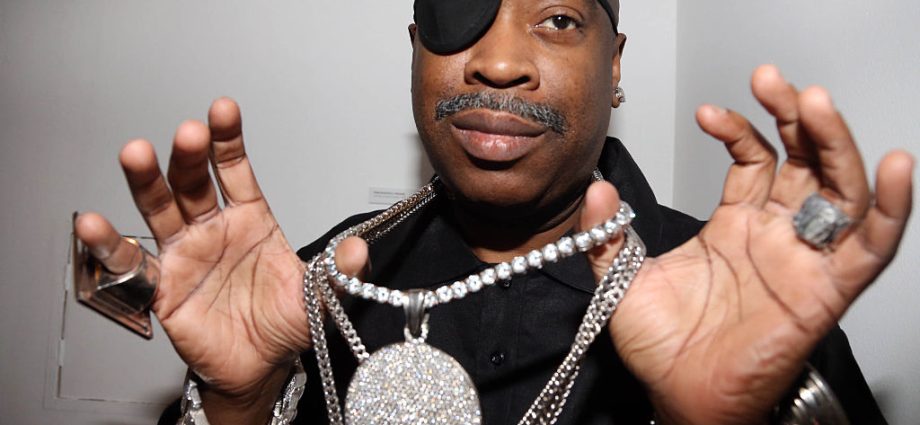Slick Rick’s influence on hip-hop goes unnoticed by the majority of hip-hop fans in the present day. However, most 90s icons will credit the London-born MC for his impact. Rapper Slick Rick has been sampled across the board, from Beyonce to MF DOOM. Even Snoop Dogg’s “La Di Da Di” off of Doggystyle directly draws inspiration from Dougie E. Fresh and Slick Rick’s iconic “Lodi Dodi.” Nowadays, Slick Rick sits in the hall of fame of East Coast MCs. We’re reflecting on what is arguably his greatest album to date, The Art of Storytelling.
By the time Slick Rick was 18 years old, he was already making waves in the hip-hop industry. He joined Doug E. Fresh’s Get Fresh Crew under the stage name MC Ricky D. The Roots’ Questlove told Rolling Stone, “Point blank: Slick Rick’s voice was the most beautiful thing to happen to hip-hop culture. Rick is full of punchlines, wit, melody, cool cadence, confidence, and style. He is the blueprint.” His early success culminated with his signing to Def Jam Records in 1986, becoming only the third artist who inked a deal with the label.
Slick Rick’s The Art of Storytelling Revived His Career

Just over a decade after his debut album The Great Adventures of Slick Rick, the then 34-year-old was in utter need of a career revival. Subsequent projects in the forms of The Ruler’s Back and Behind Bars didn’t achieve the success of Rick’s debut. However, The Ruler was still able to solidify his own sonic lane by the time his fourth studio album rolled around. He made his debut in the late 80s, just as hip-hop began gaining commercial steam. However, as the 90s rolled around, and a new generation of rappers who he influenced emerged, legal issues and other hurdles had him in and out of the public eye throughout the peak of his relevance.
With The Art of Storytelling being Slick Rick’s final album, his overarching vision was to create a record that was timeless. Upon its release, the project reached No.8 on the Billboard 200 and No.1 on the Top R&B/Hip-Hop chart. As implied by the album’s name, Slick Rick had garnered a reputation for his iconic pen. Known for tracks that were almost too personal, if such a thing exists, the focus of The Art of Storytelling is on uncompromising honesty. Rather than the grandiosity of many of his contemporaries, Rick was writing verses existing in the weeds of reality.
The Art of Storytelling Influenced Future Rappers

In particular, the project’s crown jewel would become the Outkast-aided “Street Talkin’.” More specifically, Big Boi shines on what would become one of the most commercially successful cuts in Slick Rick’s discography. The Art of Storytelling also featured Nas, Raekwon, and Snoop Dogg. The star-studded feature list was an obvious testament to how much respect Rick had garnered in the music industry. He assumes a variety of personas to parallel his precarious state of mind throughout The Ary of Storytelling. His morality tales surrounding poverty brought to life the stories of his upbringing. Slick Rick told The Guardian, “I think what I brought to hip-hop was a visual, storybook-type of a style, like reading a children’s book, but in rap form.”
However, the influence of The Art of Storytelling goes beyond its in-depth lyricism. The project’s soundscapes set the DNA for many of hip-hop’s sonic tropes going forward. The Chipmunk-soul induced “Frozen” blatantly wears a Kanye West The College Dropout era hat. Tracks such as “Me & Nas Bring It To Your Hardest” or “I Own America” are engaging boom-bap outings, mirroring the style that Rick grew up around. In addition, the emphasis on the drum pacing feels prototypical of future tracks from groups such as The Neptunes. With much of the album being sampled and referenced throughout future generations, The Art of Storytelling’s influence travels far beyond its numbers.
Slick Rick Spent Five Years in Prison

Leading up to The Art of Storytelling, Slick Rick had been through the wringer. Back in 1990, Slick Rick was convicted of attempted murder in the second degree in 1991. He was sentenced to three-and-a-third-to-ten years in prison. Rick ultimately served five years and twelve days behind bars. The story began with Slick Rick’s mother hiring his first cousin, Mark Plummer, as his bodyguard. However, Plummer would allegedly begin attempting to extort money from the artist while threatening Rick and his mother. The conflict led to Slick Rick firing four shots at Plummer after finding bullet holes in his front door, with one hitting Plummer and another hitting a passerby. While neither were seriously injured, the incident permanently altered Rick’s career.
Slick Rick’s time in prison gave him a fresh mindset heading into The Art of Storytelling. He told The Guardian, “But you learn from your mistakes; what doesn’t kill you makes you stronger. You learn from your prison time, your bad and good situations. It’s like the story of Van Gogh with the ear-cutting-off: it depends on how you look at something.” The primary reason for Rick’s struggling second and third albums was that he was forced to create them in brief moments on bail. The time constraints forced him to rush the project. With The Art of Storytelling, Slick Rick was able to approach the album with a sense of purpose and reflection for the first time in a decade. The result? A generation-defining album for hip-hop.
[via] [via]
Source link

